Italian Sayings for Travel | The Basics
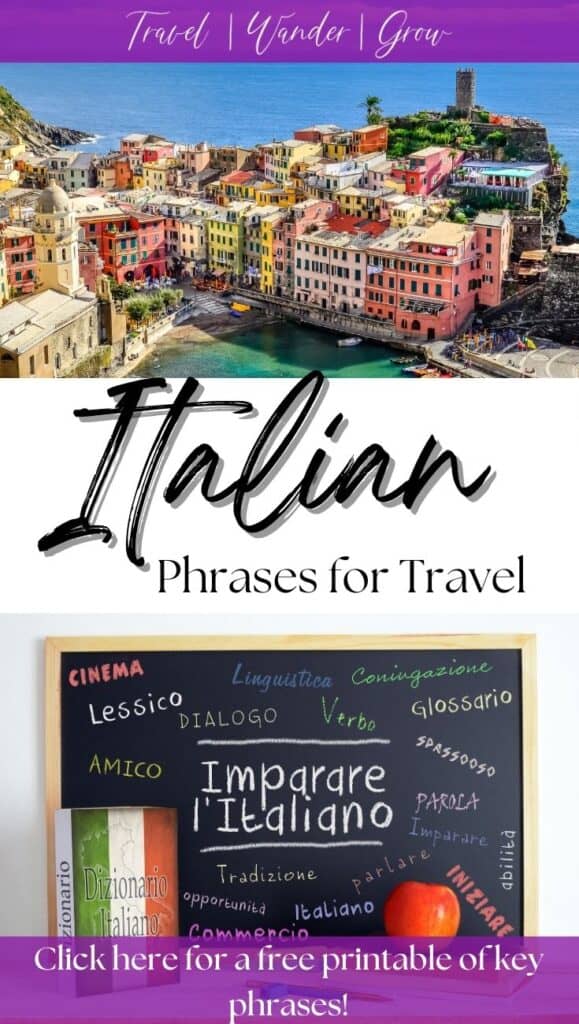
Depending on where you travel in Italy, knowing some basic phrases will help. While you will need it less in larger cities like Rome, it is still very likely you’ll wind up talking to someone who doesn’t speak English.
That’s where this post comes in! I’ll provide an overview of the language and key Italian sayings for travel that anyone traveling to Italy should know. I’ll also give you tips on the best ways you can practice these at home.
Italian Language Overview
Language History
Like all other Romance languages (Spanish, French, etc.), Italian originated from Latin. After the fall of Rome, standard Latin began to be gradually replaced by the vernacular (spoken) varieties of the language throughout the lands that were previously a part of the Roman Empire.
This held true despite the fact that Latin did continue to be the language of choice by the educated. It was still used frequently in the Church and in educational facilities.
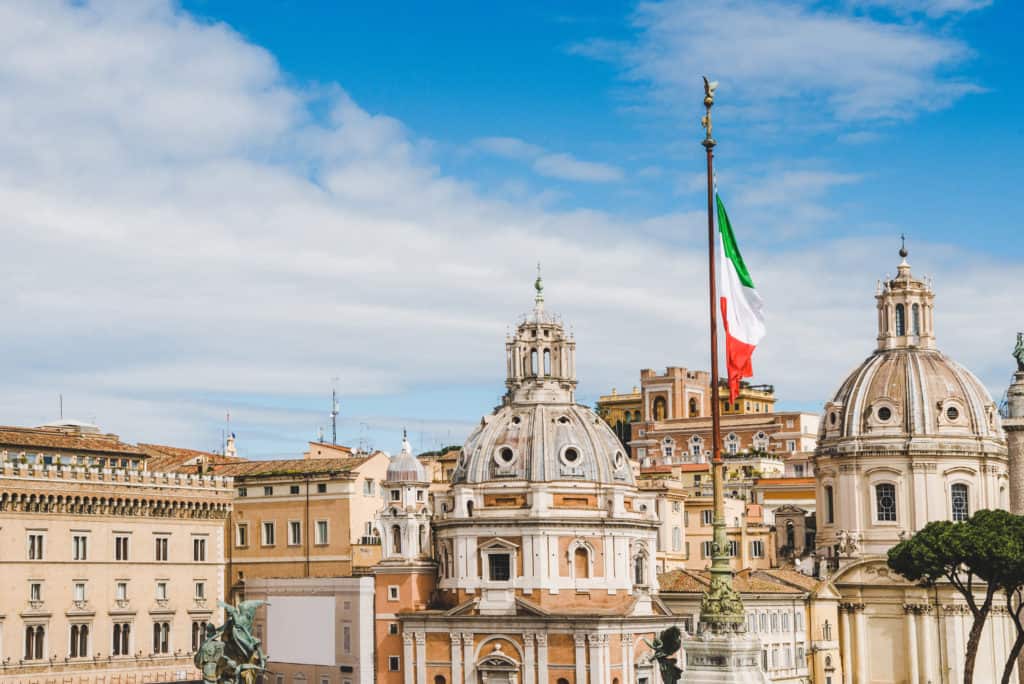
Roughly 500 years after the fall of Rome, the first written forms of the vernacular language show up. And the development of modern Italian developed slowly from there, directly from the Tuscan dialect.
One thing that is interesting about Italian is that it really wasn’t used as the standard language throughout Italy until sometime after the country was unified in 1861. In fact at that time, only about 2.5% of the country used Italian regularly. However, even today the vernacular languages / local dialects used in different regions of the country are still widely spoken.
RELATED: Four Days in Rome
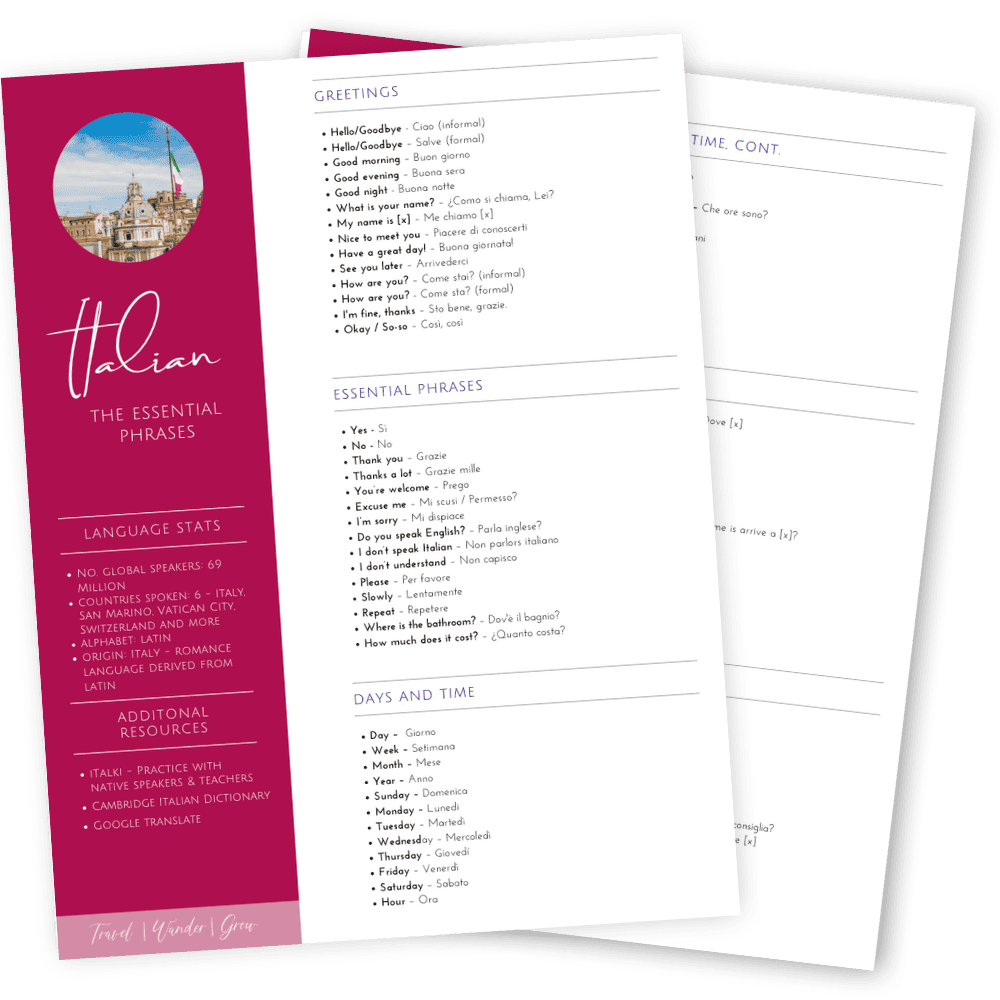
get your free download!
Italian Phrases PDF
This free download includes all the key Italian phrases that you will need for your travels throughout Italy. In addition, get details on the best resources to improve your speaking and listening skills as well.
The Language Today
Italian is a beautiful language, due to it’s song-like flow. This flow is directly tied to the fact that almost every word ends in a vowel. If you know Spanish, picking up these phrases should be a breeze, as it has 85% lexical similarity to that language as well as French.
There are just 21 letters in the Italian alphabet – j, k, w, x, and y are not part of the language, except in loan words. It is spoken for 69 million people around the globe, and over a million speakers are in the USA. Despite its relatively small footprint in the globe – it is the fourth most studied language in the world. I personally believe that it is simply due to how lovely it sounds when spoken.
Pronunciation
Italian is a phonetic language, and pronunciation is straightforward if you know the basic rules:
Vowels: Italian has the same consonants as English, but just slightly different pronunciation:
- A – Ah
- E – Eh
- I – EE
- O – Oh
- U – Ooh
Consonants: Most consonants don’t differ too greatly, but there are some exceptions:
- H -Mostly silent
- R – R’s are rolled, just slightly less than they are in Spanish
- Z – Sounds a little like a T (think of pizza)
- S – Single S sounds like a Z, while SS is more similar to the English sound
- G – Before A, O, or U it is used as in English. Before E or I, it has more of a J sound
- C – Before A, O, or U it sounds like a hard C sound (cup). Before I or E, it sounds like CH in chalk
Consonant Digraphs: The combination of two or more letters that make one sound:
- SC – Before A,O, or U it sounds like SK in the English scarf. Before E or I, it sounds like a soft SH
- GN – Produces a sound like the ñ in Spanish or the sound you hear in lasagna
- CH – Gives a K sound, like the name Christen 😉
- GLI – The G is soft and the L is more pronounced.
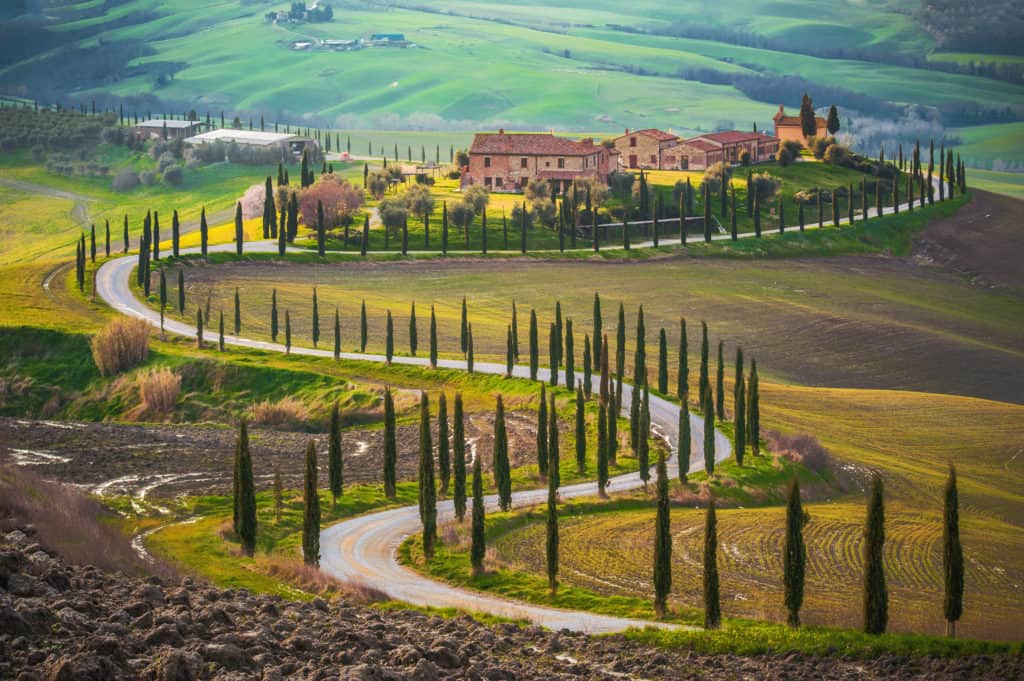
The Phrases
Italian Greetings
Here are some basic greetings (hi / goodbye) that you’d use on a regular day.
- Hello/Goodbye – Ciao (informal)
- Hello/Goodbye – Salve (formal)
- Good morning – Buon giorno
- Good evening – Buona sera
- Good night – Buona notte
- What is your name? – ¿Como si chiama, Lei?
- My name is… – Mi chaimo…
- Nice to meet you – Piacere di conoscerti
- Have a nice day! – Buona giornata!
- See you later – Arrivederci
- How are you? – Come sta? (Formal)
- How are you? – Come stai? (Informal)
- I’m fine, thanks – Sto bene, grazie.
- Okay / So-so – Così, così
- Goodbye – Arrivederci
Essential Phrases
Here are some basic greetings that you’d use on a typical day.
- Yes – Sì
- No – No
- Thank you – Grazie
- Thanks so much – Grazie mille
- You’re welcome – Prego (Also said to announce that it’s your turn)
- Excuse me – Mi scusi / Permesso?
- I’m sorry – Mi dipiace / scusa
- Do you speak English? – Parla inglese?
- I don’t speak Italian – Non parlo italiano
- I don’t understand – Non capisco
- Please – Per favore
- Slowly – Lentamente
- Repeat – Repetere
- Where is the bathroom? – Dov’è il bagno?
- How much does it cost? – Quanto costa?
Numbers
Helping you count from one to one hundred – and beyond!
| 1 – Uno | 11 – Undici | 21 – Ventuno | 40 – Quaranta |
| 2 – Due | 12 – Dodici | 22 – Ventidue | 50 – Cinquanta |
| 3 – Tre | 13 – Tredici | 23 – Ventitré | 60 – Sessanta |
| 4 – Quattro | 14 – Quattordici | 24 – Ventiquattro | 70 – Settanta |
| 5 – Cinque | 15 – Quindici | 25 – Venticinque | 80 – Ottantanta |
| 6 – Sei | 16 – Sedici | 26 – Ventisei | 90 – Novanta |
| 7 – Sette | 17 – Diciasette | 27 – Ventisette | 100 – Cento |
| 8 – Otto | 18 – Diciotto | 28 – Ventotto | 1000 – Mille |
| 9 – Nove | 19 – Diciannove | 29 – Ventinove | 1,000,000 – Un Milione |
| 10 – Dieci | 20 – Venti | 30 – Trenta |
Days and Time
The days of the week and Italian phrases related to time-telling.
- Day – Giorno
- Week – Settimana
- Month – Mese
- Year – Anno
- Sunday – Domenica
- Monday – Lunedí
- Tuesday – Martedí
- Wednesday – Mercoledí
- Thursday – Giovedí
- Friday – Venerdí
- Saturday – Sabato
- Today – Oggi
- Tomorrow – Domani
- Day After Tomorrow – Dopodomani
- Yesterday – Ieri
- Minute – Minuto
- Hour – Ora
- Time – Tempo
- What time is it? – Che ore sono?
Getting Around
Phrases and words for getting around town.
- Where is…? – Dov’è / Dove…
- The bank – La banca
- The museum – Il museo
- The park – Il parco
- The hospital – L’Ospedale
- The airport – L’Aeroporto
- The church – La Chiesa
- How do you get to…? – Come si arriva a…?
- Turn left – Gira a sinistra
- Turn right – Girare a destra
- Stay straight – Stai dritto
RELATED: The Best Places to Visit in Italy
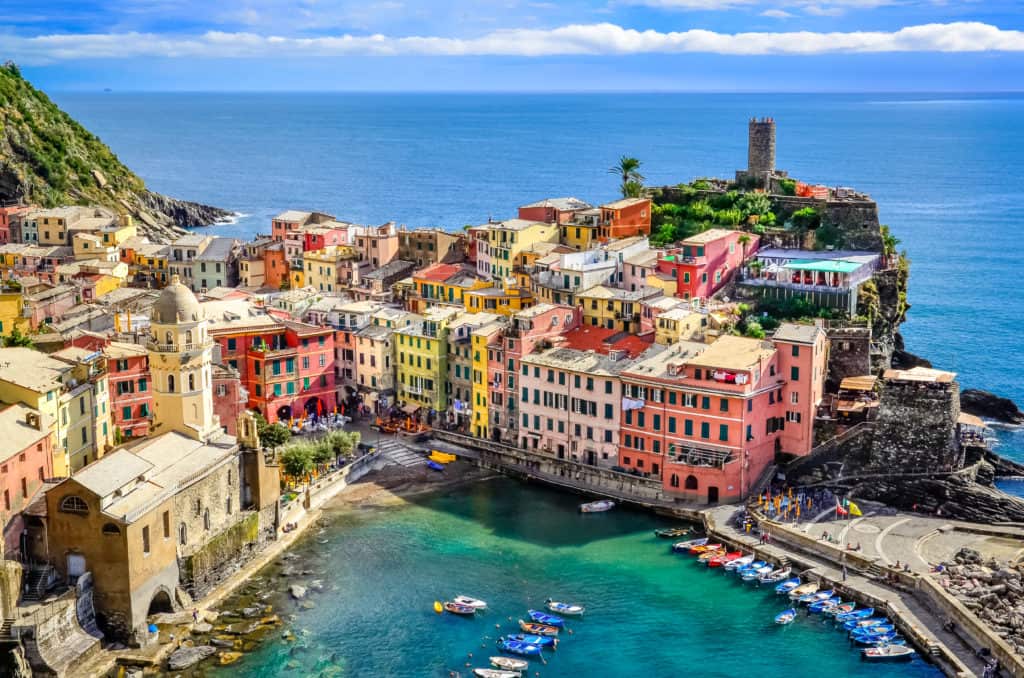

get your free download!
Italian Phrases PDF
This free download includes all the key Italian phrases that you will need for your travels throughout Italy. In addition, get details on the best resources to improve your speaking and listening skills as well.
Eating Out
Phrases and words to use when looking for or eating good Italian food.
- Restaurant – Il ristorante
- Breakfast – La colazione
- Lunch – Il pranzo
- Dinner – La cena
- Appetizer – Aperitivo
- Main Course – Portata principale
- Dessert – Dolce
- What do you recommend? – ¿Che cosa mi consiglia?
- I would like (to order)… – Vorrei ordinare…
- The bill please – Il conto per favore
Italian Sayings for Travel | Final Recommendations
With these Italian sayings for travel in your pocket, you are ready for your trip to Italy! Remember, if you are going to make these stick, you can’t do it without practice! I recommend going through this list of Italian phrases daily for at least a month before your trip.
If you have enough time, you should check out my favorite language resource, iTalki. On this site you can practice with a tutor, formal teacher, or others just seeking to do a language exchange (for free!). The paid lessons have very cheap options, with some as low as $5 an hour. Check it out!
Related Posts:
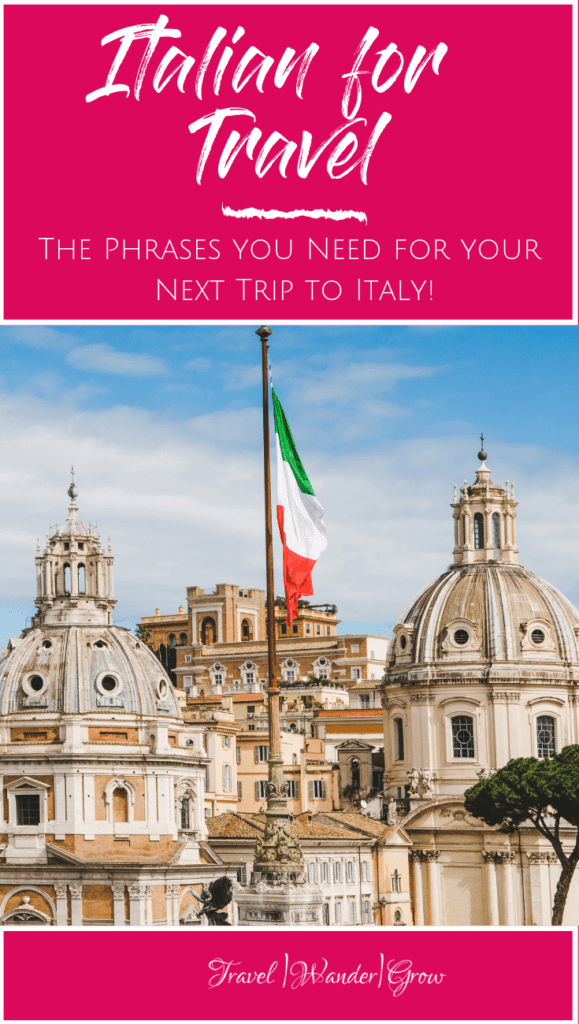
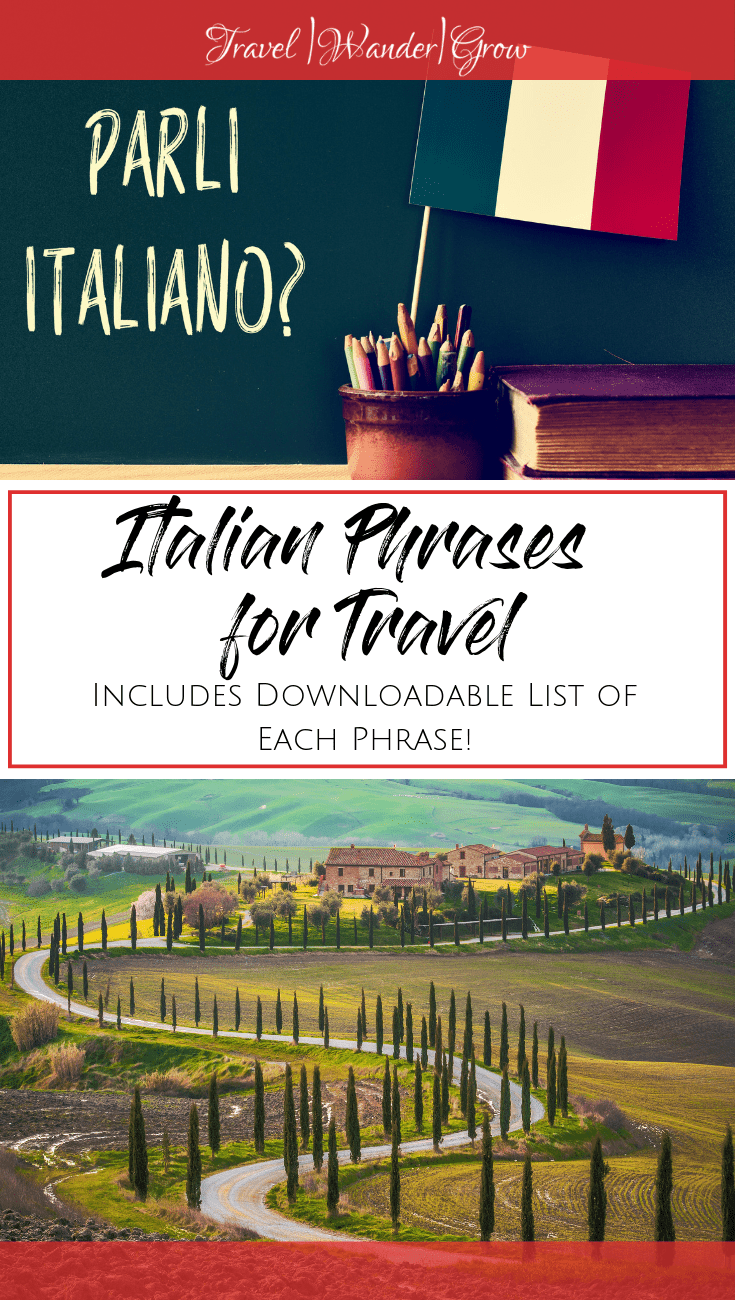

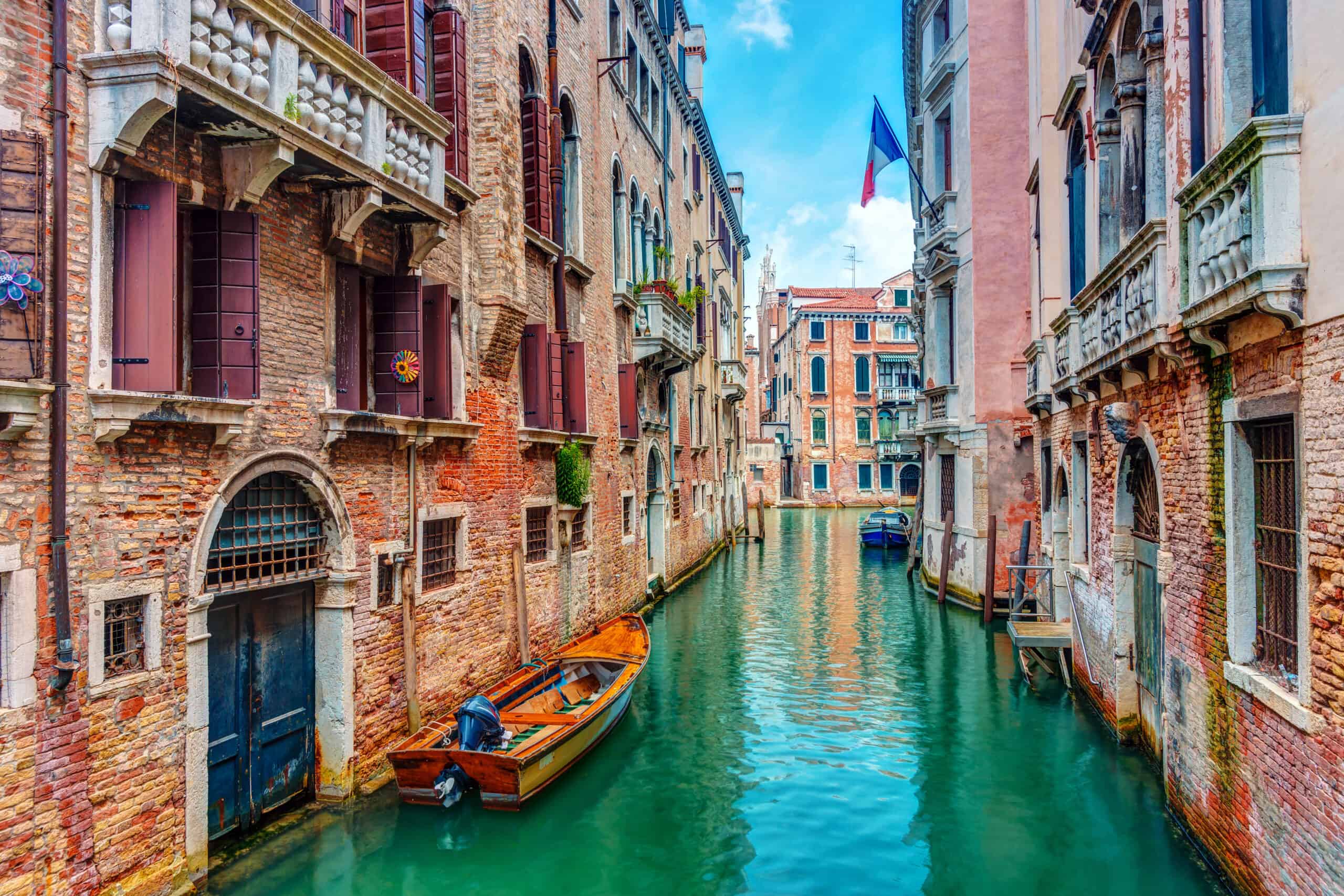
Very interesting! I wish I had seen this before my trip to Italy! It’s so interesting that Italian wasn’t widely spoke until the 1800’s, I had no idea.
Same! I need to find out more on why the selected that particular dialect when unifying the country.
Such a nice article…brought back so many memories.
I was lucky enough to visit Italy back in 2006.
Without a doubt, that was an experience that I’ll cherish for the rest of my life.
However, my knowledge of the language can definitely use some improvement.
I’ll bookmark your page for future reference in case I decide to visit this wonderful country again.
Thanks for sharing this post!
Hi Boby – I sincerely hope you do get to visit Italy soon! Glad you found the information here useful 🙂
Italian was always the second language l wanted to learn after French but unfortunately I never learned any of them, your post is very helpful for someone planing a trip to Italy or someone like me who just want to learn few phrases in Italian so I can show off to my friends lol
Showing off is another great way to use language skills, Rose! haha
Considering my plans to eventually visit europe, I should probably get a comprehensive list of these and more for the major languages. I don’t understand how some people just go to other countries with the bare minimum knowledge.
I agree! Just knowing a few words helps when visiting another country. If you’re interested, you may find my Spanish and Thai guides useful as well!
This is great. My girlfriend and I will go to Italy for vacation and these will come in handy for sure. I wonder is it easy to find restaurants which serve gluten free food in small towns. My girlfriend really can’t eat these stuff so I started doing my homework.
Yes, I’ve found that the little, really good restaurants tend to have the best food (but the least English). These tips will definitely help there!
Dear Christen
Thank you very much for your fantastic website. It is amazing that you show people where to start and what steps to make towards their dream-like travel. I hope more people will know about your website and follow your guidance.
Kind regards,
Andrey
Thanks for your kind words, Andrey!
Hi Christen,
This is a very interesting post and will be very helpful for first-time visitors to Italy. Mastering the language may not be required if you are a just going as a tourist but basic phrases, counting and little more is always helpful. I would request you some more information in some of your next post about the places to be visited and culture. Do you have additional posts on those topics?
Hi Arun, yes I do! Please check out this link to access my pages on Italy.
This article is so innovative and well constructed I got plenty of information from this post. Keep writing related to the topics on your site.
prediksi bola
Glad this is helpful to you!
This article is so innovative and well constructed I got plenty of information from this post. Keep writing related to the topics on your site.
Glad you’ve found the post helpful, Vanessa!
the article you create is very interesting, I really like to read it